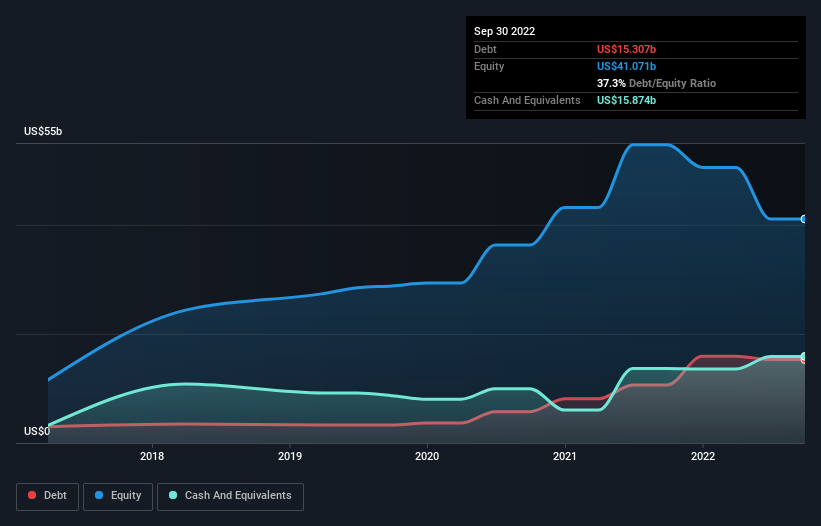Is Prosus (AMS:PRX) Weighed On By Its Debt Load?

Some say volatility, rather than debt, is the best way to think about risk as an investor, but Warren Buffett famously said that 'Volatility is far from synonymous with risk.' When we think about how risky a company is, we always like to look at its use of debt, since debt overload can lead to ruin. We can see that Prosus N.V. (AMS:PRX) does use debt in its business. But the more important question is: how much risk is that debt creating?
When Is Debt A Problem?
Generally speaking, debt only becomes a real problem when a company can't easily pay it off, either by raising capital or with its own cash flow. Ultimately, if the company can't fulfill its legal obligations to repay debt, shareholders could walk away with nothing. However, a more common (but still painful) scenario is that it has to raise new equity capital at a low price, thus permanently diluting shareholders. Having said that, the most common situation is where a company manages its debt reasonably well - and to its own advantage. The first thing to do when considering how much debt a business uses is to look at its cash and debt together.
Check out our latest analysis for Prosus
What Is Prosus's Debt?
The image below, which you can click on for greater detail, shows that at September 2022 Prosus had debt of US$15.3b, up from US$10.7b in one year. But on the other hand it also has US$15.9b in cash, leading to a US$567.0m net cash position.

How Healthy Is Prosus' Balance Sheet?
We can see from the most recent balance sheet that Prosus had liabilities of US$5.59b falling due within a year, and liabilities of US$15.5b due beyond that. Offsetting this, it had US$15.9b in cash and US$1.22b in receivables that were due within 12 months. So its liabilities total US$4.00b more than the combination of its cash and short-term receivables.
Since publicly traded Prosus shares are worth a very impressive total of US$105.2b, it seems unlikely that this level of liabilities would be a major threat. However, we do think it is worth keeping an eye on its balance sheet strength, as it may change over time. Despite its noteworthy liabilities, Prosus boasts net cash, so it's fair to say it does not have a heavy debt load! When analysing debt levels, the balance sheet is the obvious place to start. But it is future earnings, more than anything, that will determine Prosus's ability to maintain a healthy balance sheet going forward. So if you want to see what the professionals think, you might find this free report on analyst profit forecasts to be interesting.
In the last year Prosus wasn't profitable at an EBIT level, but managed to grow its revenue by 29%, to US$7.4b. Shareholders probably have their fingers crossed that it can grow its way to profits.
So How Risky Is Prosus?
Although Prosus had an earnings before interest and tax (EBIT) loss over the last twelve months, it made a statutory profit of US$5.3b. So taking that on face value, and considering the cash, we don't think its very risky in the near term. One positive is that Prosus is growing revenue apace, which makes it easier to sell a growth story and raise capital if need be. But that doesn't change our opinion that the stock is risky. There's no doubt that we learn most about debt from the balance sheet. However, not all investment risk resides within the balance sheet - far from it. To that end, you should learn about the 2 warning signs we've spotted with Prosus (including 1 which can't be ignored) .
At the end of the day, it's often better to focus on companies that are free from net debt. You can access our special list of such companies (all with a track record of profit growth). It's free.
New: Manage All Your Stock Portfolios in One Place
We've created the ultimate portfolio companion for stock investors, and it's free.
• Connect an unlimited number of Portfolios and see your total in one currency
• Be alerted to new Warning Signs or Risks via email or mobile
• Track the Fair Value of your stocks
Have feedback on this article? Concerned about the content? Get in touch with us directly. Alternatively, email editorial-team (at) simplywallst.com.
This article by Simply Wall St is general in nature. We provide commentary based on historical data and analyst forecasts only using an unbiased methodology and our articles are not intended to be financial advice. It does not constitute a recommendation to buy or sell any stock, and does not take account of your objectives, or your financial situation. We aim to bring you long-term focused analysis driven by fundamental data. Note that our analysis may not factor in the latest price-sensitive company announcements or qualitative material. Simply Wall St has no position in any stocks mentioned.
About ENXTAM:PRX
Prosus
Engages in the e-commerce and internet businesses in Asia, Europe, Latin America, North America, and internationally.
Fair value with mediocre balance sheet.


